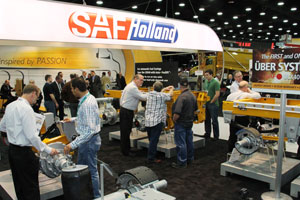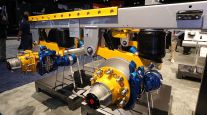SAF-Holland Won't Bid Against ZF Friedrichshafen for Haldex

The original bid of 94.42 kronor a share is “already an attractive offer” and reflects “opportunities for both Haldex and SAF-Holland,” Detlef Borghardt, CEO of the Luxembourg-based manufacturer, told reporters on a conference call Aug. 11. SAF decided against entering a bidding contest against ZF because it wouldn’t be in the interest of shareholders, the CEO said. He reiterated an Aug. 24 deadline for Haldex investors to accept the proposal.
SAF’s unsolicited offer for Stockholm-based Haldex in mid-July was topped by ZF’s bid a week ago of 100 kronor a share, which values the Swedish company at 4.41 billion kronor ($521 million). The competition reflects automotive suppliers’ increasing efforts to combine to develop advanced self-driving and electric-power technologies for vehicles. SAF’s products include suspensions for commercial vehicles as well as coupling and docking setups for truck trailers.
ZF CEO Stefan Sommer said Aug. 4 that Haldex’s brake systems will fill a gap in the Friedrichshafen, Germany-based company’s lineup as it seeks to adapt autonomous-driving technology for cars to trucks. The Swedish manufacturer’s board has recommended that shareholders accept ZF’s offer.
SAF’s decision against raising the Haldex offer price “is based on a long-term strategy and not on a quarterly result in some markets” amid recent drops in truck demand, Borghardt said.
Letting Haldex go to ZF marked “a good decision by SAF-Holland not to engage in a bidding war,” Hans-Joachim Heimbuerger, an analyst at Kepler Cheuvreux, said in a report to clients.
SAF will continue to pursue a strategy to increase yearly sales to 1.5 billion euros ($1.67 billion) by 2020 and will seek to buy companies that give it access to new regions and products, Borghardt said. Revenue rose 11% last year to 1.06 billion euros.


